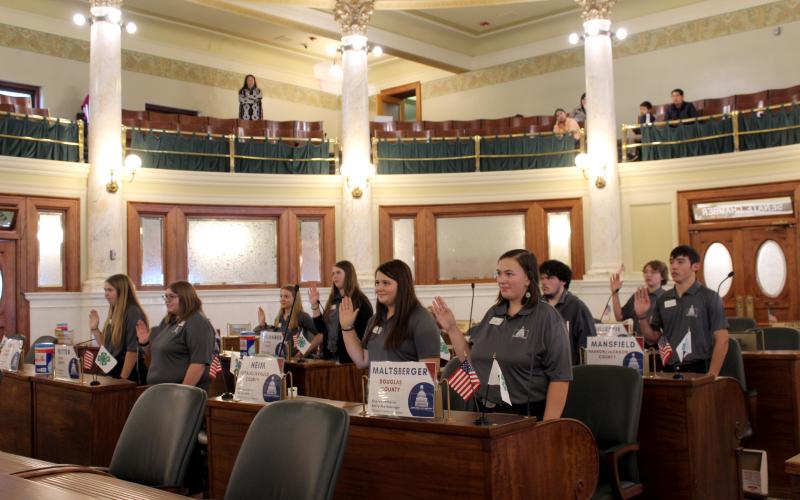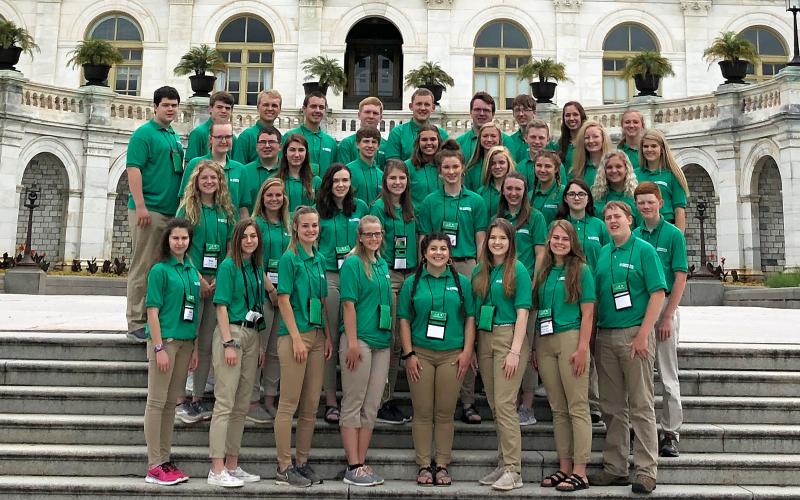Effective with the FY-2011 State of South Dakota budget cycle, which saw allocation reductions to many state agencies, SDSU Extension regionalized three program areas (Agriculture and Natural Resources; Community Vitality; Family, Food, and Wellness) while maintaining a county-based presence in 4-H. Regional centers spread throughout the state now serve as the presence for the three regionalized program areas while county offices continue serving as the main presence for South Dakota 4-H.
Counties with 4-H Partnership Status
To achieve our mission of providing place-based education for all youth, South Dakota 4-H enters into partnership with counties throughout the state. The terms of these partnerships are formalized in the Memorandum of Understanding (MOU) signed annually. Regardless of MOU type, SDSU Extension retains authority over the policies and procedures of the South Dakota 4-H program. Counties select from one of three MOU pathways, typically defined by personnel structure:
- SDSU Extension 4-H Educator(s): These counties partner in a cost-share arrangement with SDSU Extension to house a local 4-H employee(s) supervised by SDSU Extension. 4-H programming in these counties tends to be evenly balanced between traditional and outreach. As part of the mutually beneficial cost-share arrangement, Educators devote one quarter of their time to supporting state-level 4-H activities and curriculum. The Educator is supervised by the State 4-H Program Director, while office support staff are supervised by the county. Counties provide reasonable office/supply, secretarial, programming, and travel support.
- County-supervised 4-H Educator: No cost-share arrangement with SDSU Extension; the county covers the full cost and covers employee supervision. These counties tend to have sufficient resources and a desire to see the 4-H program experience growth through employee continuity. School-based programming is permitted because the Educator has a bachelor’s degree. Service levels are usually at or near full-time status. County-supervised Educators often voluntarily support state-level 4-H activities/curriculum dependent on county needs. [These counties are known internally as Option X.]
- County-supervised 4-H Program Assistant: No cost-share arrangement with SDSU Extension; the county covers the full cost and covers employee supervision. These counties tend to be smaller and lighter in resources. School-based programming is not permitted because the employee does not meet the bachelor’s degree minimum preferred by the Department of Education. Service levels are rarely full-time and programming is usually traditional only. County-supervised 4-H Program Assistants infrequently support state-level 4-H activities. [These counties are known internally as Option Z.]
As the land-grant university extension program for South Dakota, SDSU Extension maintains full authority over the 4-H program and its policies and procedures. It is SDSU Extension’s stated desire to enter into an MOU and maintain a positive partnership with each county in South Dakota. On occasion, either the county or SDSU Extension choose not to maintain an MOU relationship. This results in that county losing its 4-H status. Becoming a non-status county is often disappointing for the 4-H member families and partners in the local community.
Counties without 4-H Partnership Status
SDSU Extension maintains the express right over the 4-H program, regardless of MOU type or status. In the infrequent cases in which an MOU relationship does not exist, SDSU Extension will generally follow the procedures outlined below. When possible, sufficient notice will be given to allow for as smooth a member/volunteer/club transition process as possible.
The county will no longer have a physical Extension/4-H presence.
- No programming in the name of 4-H or SDSU Extension will exist within the county borders. In addition to traditional 4-H programming, this also includes school and afterschool programming.
- The 4-H charters for all county 4-H clubs and affiliates will be revoked and those entities will cease operations and disband within existing policy.
- Certified 4-H volunteers will terminate their service, unless a) they are accepted for transfer to another county program or b) they are retained as a state-level volunteer.
- Youth may continue to participate in the 4-H program under one of two pathways:
- Self-sufficient Path: All 4-H members residing in the county will have the option to transfer to independent (i.e., non-club) membership status in the county. Though no local events or meetings will occur, youth choosing this path will remain eligible for regional, state, and national 4-H event participation. Resources available on the SDSU Extension website will serve as the only member support mechanism. Youth may NOT become independent members in another county’s program.
- Supported Path: For youth who still desire a club and county event experience. These youth may transfer membership to another county 4-H program, but will need to abide by that county’s participation terms accordingly. Affected county youth who are already members in another county 4-H program may continue that relationship so long as that county continues to accept them. At their discretion, counties are permitted to set reasonable fees for out-of-county youth participants.
If an out-of-county youth had previously transferred into a county 4-H program that has now become a non-partner status county, the youth may choose to a) return to their home county program (if eligible), b) explore another out-of-county relationship, or c) go independent.
Any local attempts within a non-partner county to mimic Extension/4-H services after the termination date may result in the rescinding of option 5 above and/or appropriate legal action at the sole discretion of SDSU Extension, South Dakota State University, or the United States Department of Agriculture, as applicable.
Again, it is the stated desire of South Dakota 4-H to maintain a positive partnership with each county in South Dakota. Should the situation improve for a non-status county, SDSU Extension will work with them to resume the program to partnership status.
Counites Accepting 4-H Membership Transfers
In general, 4-H maintains an ‘open’ membership philosophy throughout the state of South Dakota. This allows youth who might be better served by a neighboring county program to transfer membership. Often these transfers are a result of a specific project strength the new county possesses or an historic family connection. Regardless of the reason for membership transfer, all transfers are expected to abide by the new county’s deadlines, procedures, etc. and all receiving counties are expected to treat accepted transfer members as equals, with one exception: fees.
Out of County Membership Fees
Receiving counties are permitted to charge out-of-county youth reasonable membership fees to make up for the lack of local taxes being paid by the out-of-county family. In cases in which counties see relatively equal inflow and outflow across county lines, fees are usually not necessary. In counties that experience many incomers and few leavers, fees are more appropriate—this is the likely pattern when a partner status county is bordered by a non-partner status county.
In most cases, reasonable out-of-county membership fees can be calculated by determining the average in-county household’s tax support to the local county Extension office. For example, if a county office receives an annual budget of $75,000 and the county has 1500 households, the reasonable out-of-county participation fee would be set at $50 per household. The county auditor can easily assist with these calculations.
In unusual cases, a higher out-of-county membership fee rate may be appropriate. For example, this might include situations where increased secretarial hours have become necessary to meet the new workload. Please consult with the state 4-H office prior to implementing an unusual rate.
All membership fee structures shall be communicated transparently and applied evenly. All membership fees shall be collected by the local Extension office or appropriate county government personnel, not volunteer partner groups (e.g., leaders associations).
Out of County Event Fees
Infrequently, non-transfer youth from other counties choose to participate in specific 4-H activities out-of-county. The event-hosting county may impose a reasonable, event-specific participation fee, but the total shall not exceed the out-of-county member participation rate. Again, the fee structures shall be communicated transparently and applied evenly. If awards are given at the event, the out-of-county youth participant shall be eligible. These activity/event fees may be collected by the entity leading the event.


